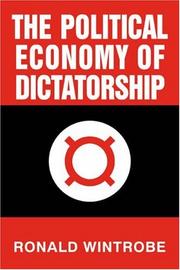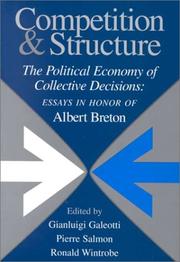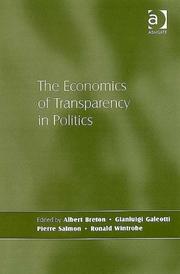| Listing 1 - 10 of 11 | << page >> |
Sort by
|

ISBN: 0521794498 0521583292 1139174916 9780521583299 9780521794497 9781139174916 Year: 1998 Publisher: Cambridge Cambridge University Press
Abstract | Keywords | Export | Availability | Bookmark
 Loading...
Loading...Choose an application
- Reference Manager
- EndNote
- RefWorks (Direct export to RefWorks)
Although much of the world still lives today, as always, under dictatorship, the behaviour of these regimes and of their leaders often appears irrational and mysterious. In The Political Economy of Dictatorship, Ronald Wintrobe uses rational choice theory to model dictatorships: their strategies for accumulating power, the constraints on their behavior, and why they are often more popular than is commonly accepted. The book explores both the politics and the economics of dictatorships, and the interaction between them. The questions addressed include: What determines the repressiveness of a regime? Can political authoritarianism be 'good' for the economy? After the fall, who should be held responsible for crimes against human rights? The book contains many applications, including chapters on Nazi Germany, Soviet Communism, South Africa under apartheid, the ancient Roman Empire and Pinochet's Chile. It also provides a guide to the policies which should be followed by the democracies towards dictatorships.
Political systems --- Economics --- Dictatorship. --- Rational choice theory. --- Economic development. --- 338.22 --- 330.34 --- 338 --- Economische organisatieleer. Economisch beleid. Economische politiek --- Economische ontwikkeling. Regionale economische ontwikkeling --- Economische situatie. Economische structuur van bepaalde landen en gebieden. Economische geografie. Economische produktie.economische produkten. Economische diensten --- 338 Economische situatie. Economische structuur van bepaalde landen en gebieden. Economische geografie. Economische produktie.economische produkten. Economische diensten --- 330.34 Economische ontwikkeling. Regionale economische ontwikkeling --- 338.22 Economische organisatieleer. Economisch beleid. Economische politiek --- Dictatorship --- Economic development --- Rational choice theory --- Social choice --- Development, Economic --- Economic growth --- Growth, Economic --- Economic policy --- Statics and dynamics (Social sciences) --- Development economics --- Resource curse --- Absolutism --- Autocracy --- Tyranny --- Authoritarianism --- Despotism --- Totalitarianism --- Business, Economy and Management

ISBN: 0521859646 9780521859646 9780511511028 9781107407220 0511250037 9780511250033 9780511250545 0511250541 0511247893 9780511247897 0511511027 9781107167469 1107167469 9786610703562 6610703566 9780511248979 0511248970 1107407222 1280703563 0511319223 0511249527 Year: 2006 Publisher: Cambridge Cambridge University Press
Abstract | Keywords | Export | Availability | Bookmark
 Loading...
Loading...Choose an application
- Reference Manager
- EndNote
- RefWorks (Direct export to RefWorks)
Extremists are people whose ideas or tactics are viewed as outside the mainstream. Looked at this way, extremists are not necessarily twisted or evil. But they can be, especially when they are intolerant and violent. What makes extremists turn violent? This 2006 book assumes that extremists are rational: given their ends, they choose the best means to achieve them. The analysis explains why extremist leaders use the tactics they do, and why they are often insensitive to punishment and to loss of life. It also explains how rational people can be motivated to die for the cause. The book covers different aspects of extremism such as revolution, suicide terrorism, and global jihad. The arguments are illustrated with important episodes of extremism, including the French Revolution, the rise of nationalism in Yugoslavia under Milosevic, and the emergence of suicide terror and Al Qaeda today.
Group identity --- Political violence --- Radicalism --- Terrorism --- #SBIB:321H81 --- #SBIB:321H91 --- #SBIB:324H72 --- #SBIB:327.5H20 --- Violence --- Political crimes and offenses --- Collective identity --- Community identity --- Cultural identity --- Social identity --- Identity (Psychology) --- Social psychology --- Collective memory --- Acts of terrorism --- Attacks, Terrorist --- Global terrorism --- International terrorism --- Political terrorism --- Terror attacks --- Terrorist acts --- Terrorist attacks --- World terrorism --- Direct action --- Insurgency --- Subversive activities --- Terror --- Extremism, Political --- Ideological extremism --- Political extremism --- Political science --- Westerse politieke en sociale theorieën vanaf de 19e eeuw : nationalisme, corporatisme, fascisme, nationaal socialisme, rechtsextremisme, populisme --- Niet-specifieke politieke en sociale theorieën vanaf de 19e eeuw: islam, Arabisch nationalisme --- Politieke verandering: conflictlijnen, nationalisme/federalisme --- Vredesonderzoek: algemeen --- International movements --- Microeconomics --- Economic order --- Radicalism. --- Political violence. --- Terrorism. --- Group identity. --- Business, Economy and Management --- Economics
Book
Year: 1998 Publisher: Cambridge: Cambridge university press,
Abstract | Keywords | Export | Availability | Bookmark
 Loading...
Loading...Choose an application
- Reference Manager
- EndNote
- RefWorks (Direct export to RefWorks)
Book
Year: 1998 Publisher: Cambridge, UK New York, NY Cambridge University Press
Abstract | Keywords | Export | Availability | Bookmark
 Loading...
Loading...Choose an application
- Reference Manager
- EndNote
- RefWorks (Direct export to RefWorks)
Dictatorship --- Rational choice theory --- Economic development
Book
ISBN: 0521245893 0521071720 0511896034 9780521245890 9780511896033 9780521071727 Year: 1982 Publisher: Cambridge
Abstract | Keywords | Export | Availability | Bookmark
 Loading...
Loading...Choose an application
- Reference Manager
- EndNote
- RefWorks (Direct export to RefWorks)
In this work the authors present a general theory of bureaucracy and use it to explain behaviour in large organizations and to explain what determines efficiency in both governments and business corporations. The theory uses the methods of standard neoclassical economic theory. It relies on two central principles: that members of an organization trade with one another and that they compete with one another. Authority, which is the basis for conventional theories of bureaucracy, is given a role, despite reliance on the idea of trade between bureaucracies. It is argued, however, that bureaucracies cannot operate efficiently on the basis of authority alone. Exchange between bureaucrats is hampered because promises are not enforceable. So trust and loyalty between members of bureaucratic networks play an important part. The authors find that vertical networks promote efficiency while horizontal ones impede it.
Organization theory --- Bureaucracy --- Business, Economy and Management --- Economics --- Bureaucracy. --- Interorganizational relations --- Political science --- Public administration --- Organizational sociology
Book
ISBN: 9780230613102 Year: 2009 Publisher: New York, N.Y. Palgrave Macmillan
Abstract | Keywords | Export | Availability | Bookmark
 Loading...
Loading...Choose an application
- Reference Manager
- EndNote
- RefWorks (Direct export to RefWorks)

ISBN: 0521771331 9780521771337 Year: 2000 Publisher: Cambridge Cambridge University Press
Abstract | Keywords | Export | Availability | Bookmark
 Loading...
Loading...Choose an application
- Reference Manager
- EndNote
- RefWorks (Direct export to RefWorks)
Microeconomics --- Administration fédérale --- Autorités fédérales --- Besluitvorming --- Besluitvormingsanalyse --- Besluitvormingsprocessen --- Competition --- Concurrence --- Concurrentie --- Coordination des politiques entre gouvernement fédéral et États fédérés --- Deciding --- Decision analysis --- Decision making --- Decision processes --- Decision-making --- Division des pouvoirs entre gouvernement fédéral et États fédérés --- Division of powers --- Décision [Prise de ] --- Décision [Théorie de la ] --- Economic nationalism --- Economic planning --- Economic policy --- Economisch beleid --- Economische politiek --- Federal government --- Federal government -- Law and legislation --- Federal state --- Federal systems --- Federal-provincial relations --- Federal-state relations --- Federale regering --- Federale regeringsvorm --- Federale staat --- Federale staat -- Recht en wetgeving --- Federalism --- Federalisme --- Fédéral [Gouvernement ] --- Fédéralisme --- Gouvernement central (État fédéral) --- Gouvernement fédéral --- Gouvernement fédéral -- Droit et législation --- Gouvernement représentatif --- Harmonisation des politiques entre gouvernement fédéral et États fédérés --- Making decisions --- Management decisions --- Management--Beslissingen --- Management--Besluitvorming --- Management--Decision making --- Mededinging --- National planning --- Parlementarisme --- Parliamentary government --- Political representation --- Politiek [Economische ] --- Politique économique --- Pouvoir fédéral --- Pouvoirs [Division des ] entre gouvernement fédéral et États fédérés --- Prise de décision --- Relations gouvernement fédéral-États fédérés --- Relations États fédérés-gouvernement fédéral --- Representation --- Representative government and representation --- Self-government --- State planning --- Système fédéral --- Théorie de la décision --- Volksvertegenwoordiging --- État fédéral --- États fédérés et gouvernement fédéral --- 338.22 --- Economische organisatieleer. Economisch beleid. Economische politiek --- 338.22 Economische organisatieleer. Economisch beleid. Economische politiek --- Constitutional history --- Constitutional law --- Political science --- Democracy --- Elections --- Republics --- Suffrage --- Powers, Division of --- Provincial-federal relations --- State-federal relations --- Central-local government relations --- Decentralization in government --- Economics --- Planning --- National security --- Social policy --- Decision (Psychology) --- Management --- Choice (Psychology) --- Problem solving --- Competition (Economics) --- Competitiveness (Economics) --- Economic competition --- Commerce --- Conglomerate corporations --- Covenants not to compete --- Industrial concentration --- Monopolies --- Open price system --- Supply and demand --- Trusts, Industrial --- Law and legislation --- Economic aspects

ISBN: 9780754649335 9781315240077 9781351890946 9781138277663 Year: 2007 Publisher: Aldershot Ashgate
Abstract | Keywords | Export | Availability | Bookmark
 Loading...
Loading...Choose an application
- Reference Manager
- EndNote
- RefWorks (Direct export to RefWorks)
#SBIB:35H510 --- #SBIB:35H24 --- Openbaarheid van bestuur, ombudsdienst, ... --- Informatiemanagement bij de overheid --- Disclosure of information. --- Freedom of information. --- Government information. --- Transparency in government. --- Disclosure of information --- Freedom of information --- Government information --- Transparency in government --- Government in the sunshine --- Open government (Transparency in government) --- Openness in government --- Sunshine, Government in the --- Transparence in government --- Public administration --- Information, Government --- Public records --- Information, Freedom of --- Liberty of information --- Right to know --- Civil rights --- Freedom of speech --- Intellectual freedom --- Telecommunication --- Information, Disclosure of --- Truthfulness and falsehood --- Openbaarheid van bestuur, ombudsdienst, .. --- Law and legislation --- Openbaarheid van bestuur, ombudsdienst, . --- Openbaarheid van bestuur, ombudsdienst,
Book
ISBN: 0228007100 0228007097 9780228007104 9780228007098 9780228006084 0228006082 9780228006077 0228006074 Year: 2021 Publisher: Montreal Kingston London Chicago
Abstract | Keywords | Export | Availability | Bookmark
 Loading...
Loading...Choose an application
- Reference Manager
- EndNote
- RefWorks (Direct export to RefWorks)
Robert (Bob) Andrew Young (1950-2017) was Canada Research Chair in Multilevel Governance at the University of Western Ontario and one of Canada's most distinguished political scientists. In Across Boundaries Young's former colleagues and students bring together contributions from his extensive network. These essays speak to Young's legacy while providing new insight into research in multilevel governance, secession, and political economy.
Central-local government relations. --- Federal government. --- Political science.
Book

ISBN: 9780812207989 Year: 2013 Publisher: Philadelphia
Abstract | Keywords | Export | Availability | Bookmark
 Loading...
Loading...Choose an application
- Reference Manager
- EndNote
- RefWorks (Direct export to RefWorks)
| Listing 1 - 10 of 11 | << page >> |
Sort by
|

 Search
Search Feedback
Feedback About UniCat
About UniCat  Help
Help News
News